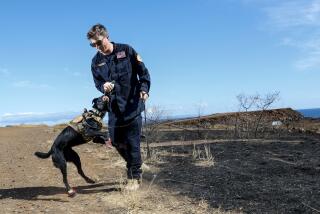Diving Dogs : Canines That Detect Corpses’ Odor Help Find Bodies Underwater
- Share via
MISSION VIEJO — His shoes and socks were found in a car by the lake, but the 21-year-old man had vanished. Police investigators had the grim feeling that he was lying at the bottom of Lake Mission Viejo.
Frogmen from the sheriff’s dive team had begun their slow, methodical sweep of the muddy lake bottom when the latest advance in underwater detection arrived: Hershe, a brown Labrador retriever and county rescue dog.
Hershe took a few loud sniffs of the lakeside dock and bounded into the cold water. Within minutes of being coaxed back onto a boat, the dog began quivering in excitement, alerting his trainer that the missing man’s scent was nearby.
About 40 feet below the surface of that spot, divers discovered the body of the young man, who had been missing for six days in early March.
“A lot of people, including deputies, still don’t believe it,” Hershe’s handler, Ron Moore, said of the dog’s feat this month. “They come up to me and say, ‘Naaaah, it can’t be.’ ”
But, in fact, dogs have been used to detect underwater graves for decades by a handful of search-and-rescue teams nationwide.
“The dogs really aren’t doing anything amazing,” said Moore, county forensic scientist who is also an Orange County reserve officer. “They’re just doing something that we weren’t aware of yet.”
Hershe’s training started about a year ago with the endorsement of sheriff’s officials. The Mission Viejo operation marked the first time Hershe had been used in an actual recovery.
The recent development of chemicals to simulate the odor of death to dogs has quickly advanced the training of search-and-rescue dogs.
The dogs respond to human scents that rise to the surface. Gases are emitted by decomposition and linger on the water surface. Body oils and tissue make their way to the surface as well.
For Hershe, a boisterous 3-year-old, a successful find means a reward--a round of Frisbee toss with Moore. But for human handlers, it means ending a family’s unbearable uncertainty.
“You want to bring an end to these people’s pain,” said retired county rescue worker Larry Harris, whose bloodhounds also were at Lake Mission Viejo. “It’s the not knowing that’s the worst.”
Although divers probably would have found the body in their next sweep, “the dogs can cut our time down tremendously if they’re accurate,” said Mark Klopp, a reserve diver for the sheriff’s dive team.
More to Read
Sign up for Essential California
The most important California stories and recommendations in your inbox every morning.
You may occasionally receive promotional content from the Los Angeles Times.













